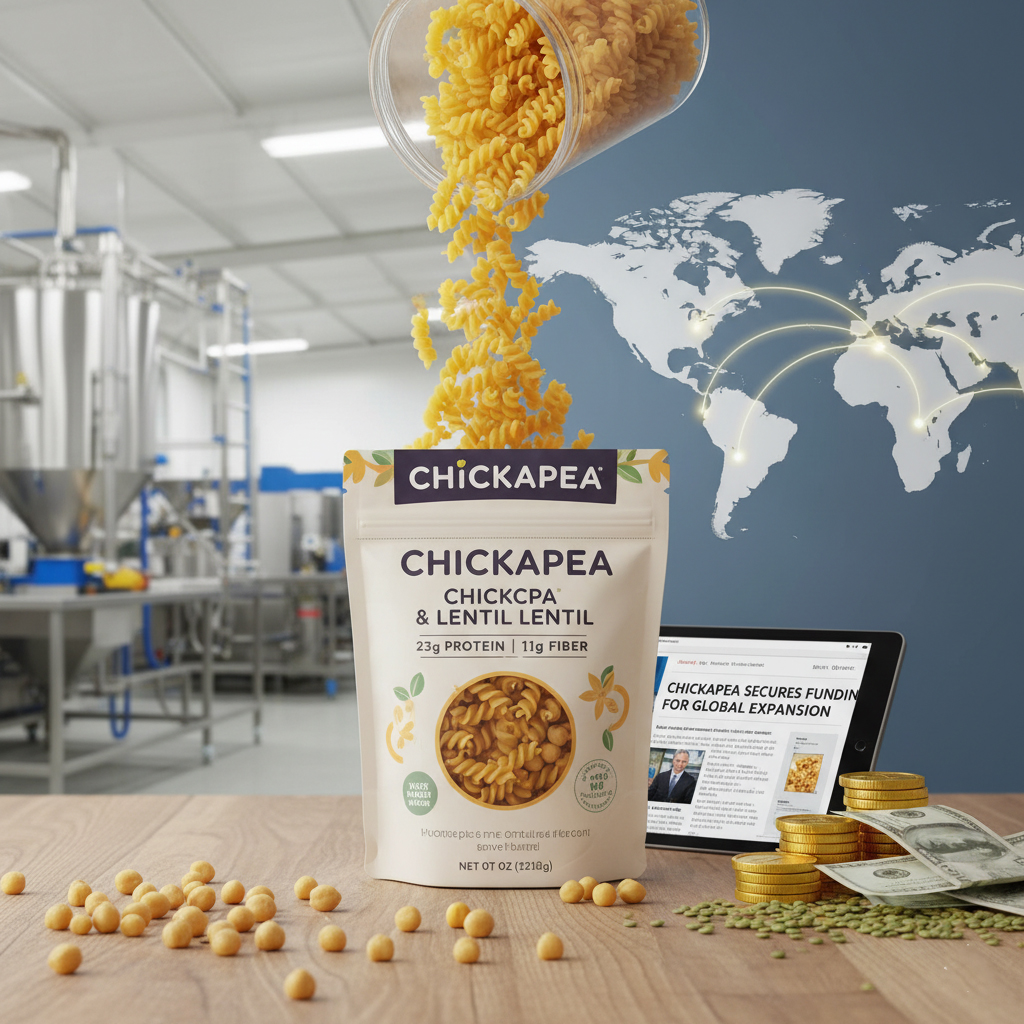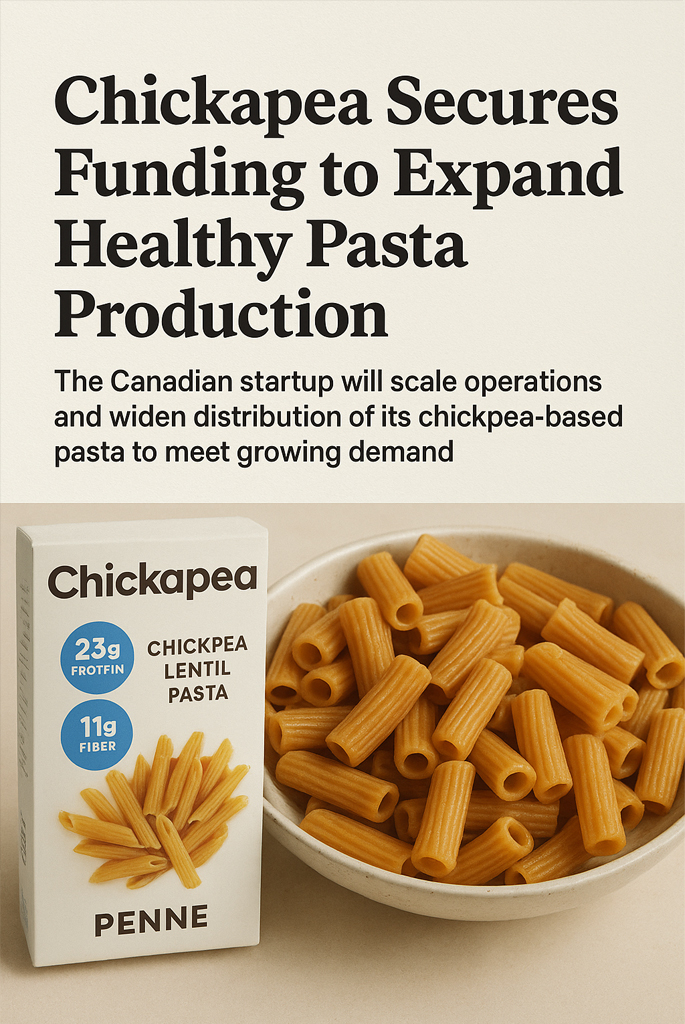Premium Biz Post – The food industry continues to embrace healthier, plant-based alternatives, and one of the rising names in this movement is Chickapea. Recently, the Canadian startup announced that Chickapea secures funding to expand healthy pasta production, a milestone that signals both investor confidence and consumer demand for nutrient-rich food options. With this new capital injection, Chickapea aims to scale its operations, widen its distribution, and introduce innovative product lines to capture the growing health-conscious market segment.

The Growth of Chickpea-Based Products
Over the past decade, chickpeas have transformed from a staple legume in Middle Eastern diets to a global superfood. Their versatility has led to a surge in chickpea-based products such as hummus, snacks, flour, and, most notably, pasta. Chickapea has positioned itself as a pioneer in this niche, offering pasta products that are not only gluten-free but also high in protein and fiber. This resonates with health-conscious consumers who want alternatives to traditional wheat-based pasta without compromising taste or texture.
Chickapea’s innovation lies in its ability to blend chickpeas with lentils to create pasta that mimics the traditional pasta experience while providing superior nutritional benefits. As demand for healthier and sustainable food options increases, Chickapea has become a favorite among families, athletes, and individuals seeking balanced diets.
Funding as a Growth Catalyst
The newly secured funding, reported to be worth several million dollars, will provide Chickapea with the financial backing needed to increase production capacity. This comes at a crucial time when consumer demand is outpacing supply, particularly in North America and parts of Europe.
Scaling production is not just about meeting demand but also about ensuring efficiency, cost-effectiveness, and consistent product quality. With state-of-the-art manufacturing technology, Chickapea plans to reduce operational bottlenecks and improve its distribution network. Investors view this as a strategic move that will allow the company to strengthen its market position in a highly competitive landscape.
The funding round also reflects broader investor interest in the plant-based food sector, which has seen exponential growth in recent years. From alternative proteins to dairy substitutes, companies like Chickapea are redefining how consumers view and consume everyday staples.
The Rise of Plant-Based Diets
Consumer interest in plant-based diets is at an all-time high, driven by health concerns, environmental awareness, and ethical considerations. Studies have shown that plant-based diets can reduce the risk of chronic illnesses, lower carbon footprints, and promote sustainable food systems.
Chickapea is tapping into this cultural shift by offering products that not only satisfy taste buds but also align with consumers’ values. The company’s chickpea pasta provides 23 grams of protein and 11 grams of fiber per serving—significantly higher than traditional wheat pasta. Moreover, it contains no artificial additives, making it a clean-label product that resonates with modern consumers.
This aligns with global food trends, where consumers are increasingly reading labels and making purchasing decisions based on nutritional transparency.
Read More : ”Make Wooden Masks Handicrafts that Generate Income”
Market Expansion Plans
With the funding in place, Chickapea’s immediate priority is to expand its production capabilities. However, the company’s vision goes beyond manufacturing. Plans are underway to extend distribution channels across North America and Europe.
Currently available in select retail chains and online platforms, Chickapea aims to secure partnerships with major supermarket chains and foodservice providers. By doing so, the company hopes to make its healthy pasta accessible to a broader consumer base.
E-commerce will also play a vital role in its growth strategy. As online grocery shopping continues to rise, Chickapea is investing in digital platforms, logistics, and marketing campaigns to strengthen its presence in the virtual marketplace.
Innovation in Product Development
Another key area of focus for Chickapea is product innovation. While the company is best known for its chickpea-lentil pasta, it is actively exploring other avenues of healthy, plant-based products. Future innovations could include pasta enhanced with additional superfoods, fortified snacks, or ready-to-eat meals that cater to the busy lifestyles of consumers.
By diversifying its product portfolio, Chickapea seeks to reduce dependency on a single product line and cater to various consumer preferences. Innovation will also help the company stand out in a market where new plant-based brands are entering every year.
The Competitive Landscape
Chickapea operates in a highly competitive segment. Brands like Banza, Barilla (with its gluten-free lines), and smaller regional players are vying for the same health-conscious audience. However, Chickapea differentiates itself with its commitment to simplicity and nutrition. Unlike many competitors, it avoids unnecessary additives and focuses solely on delivering high-protein, high-fiber pasta.
The company’s branding also emphasizes community, health, and sustainability—values that resonate strongly with Millennials and Gen Z, two demographics driving the growth of plant-based food markets.
Impact on Local and Global Communities
Chickapea’s expansion is expected to have a ripple effect on local economies. Increased production means more jobs, stronger supply chain networks, and partnerships with farmers who grow chickpeas and lentils. This not only benefits the company but also supports agricultural communities and sustainable farming practices.
Globally, Chickapea’s growth contributes to shifting consumer habits toward healthier, more sustainable diets. If more consumers replace traditional pasta with chickpea-based alternatives, the cumulative effect could be a reduction in wheat dependency and a more diversified global food system.
Challenges Ahead
Despite its strong momentum, Chickapea faces several challenges. Scaling production requires not only financial investment but also careful quality control. Any inconsistencies could harm brand reputation in a market where consumers value trust and transparency.
Additionally, supply chain disruptions—such as raw material shortages or transportation delays—could impact growth plans. Global inflation and fluctuating commodity prices also pose risks. To counter these, Chickapea is working on securing long-term contracts with suppliers and investing in robust logistics systems.
Marketing is another challenge. While awareness of plant-based diets is growing, convincing traditional pasta lovers to switch requires continuous education, sampling campaigns, and influencer partnerships. The company must strike a balance between appealing to health enthusiasts and attracting mainstream consumers.
The Future of Chickapea
Looking ahead, Chickapea’s outlook is highly promising. With strong investor backing, an expanding consumer base, and a commitment to innovation, the company is well-positioned to become a leader in the global plant-based food sector.
If executed effectively, its expansion could serve as a blueprint for other startups in the food industry. By combining sustainability, health, and taste, Chickapea is showing that food innovation can address global health and environmental challenges while also being commercially successful.
The announcement that Chickapea secures funding to expand healthy pasta production marks a pivotal moment for the startup. With new capital at its disposal, Chickapea is ready to scale operations, enter new markets, and innovate its product lineup.
As the plant-based food movement continues to gain momentum, Chickapea’s growth reflects the larger shift toward healthier, more sustainable eating habits. For consumers, this means more options on the shelves; for the food industry, it signals a new era where nutrition and sustainability take center stage.
If Chickapea succeeds in executing its ambitious plans, it will not only transform the pasta aisle but also inspire the next generation of food entrepreneurs to prioritize health, taste, and sustainability.


